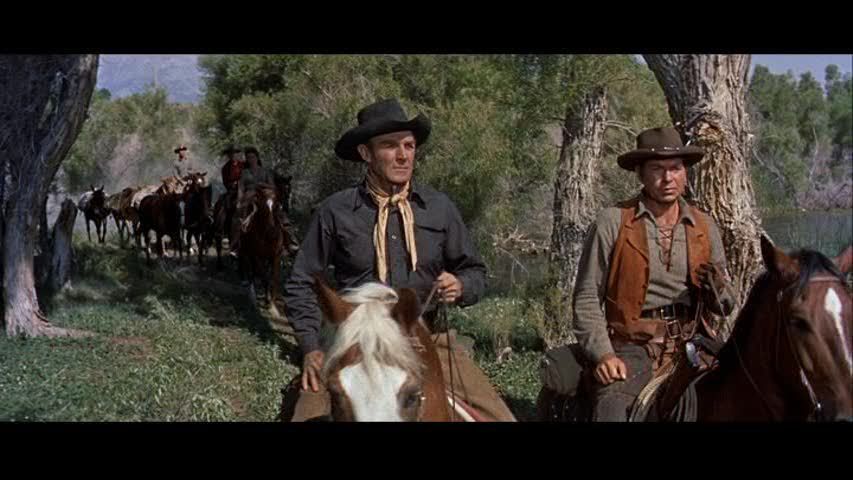
The final film of Budd Boetticher's acclaimed Ranown cycle — the seven Westerns he made with actor Randolph Scott — is Comanche Station, a typically solid, straightforward venture that recycles and shuffles around plot elements from the series' previous film, Ride Lonesome. In both films, Scott plays a man who's initially mistaken for a bounty hunter of sorts, riding the territory trying to strike it rich by trading in people, but who is actually on a private mission of his own. In the aftermath of an Indian attack, he falls in with a pretty woman and a group of no-good outlaws who want to relieve him of his bounty and his life. The two films share these basic elements, though the later film casts them in a new light. In Comanche Station, Scott's Jefferson Cody isn't bringing in a murderer to be hanged, but rescuing Nancy Lowe (Nancy Gates) from the Comanche tribe who kidnapped her. Mrs. Lowe's husband had announced a $5000 reward for any man who brought her back to him, and naturally this attracts the attention of the rough outlaw Ben (Claude Akins) and his two younger partners, Frank (Richard Rust) and Dobie (Skip Homeier). Cody, of course, wasn't in it for the money; he'd lost his wife to the Indians ten years before, and had been looking for her ever since, going after any women he heard about in the increasingly slender hope of someday finding his own missing wife.
When attacking Indians throw Cody and Mrs. Lowe in with the three outlaws, the trip back to her hometown becomes a tense journey through some of the most astoundingly beautiful vistas to be featured in any of Boetticher's films. With the threat of Indians signaled in the hills by their pillars of black smoke and bird calls in the surrounding woods, Cody finds himself trapped between the Indians and the potential treachery of his riding partners. It hardly helps that he served as Ben's commanding officer in the army, and presided over the other man's dishonorable discharge. There's a lot of bad blood in their past, though Ben seems to foster a grudging respect for the honorable, straight-talking Cody — just not enough respect to dissuade him from taking a shot at that $5000.

Despite the high stakes, the film has a meandering, lazy feel completely at odds with the dramatic tension at its core. Perhaps Boetticher's defining characteristic as a director of Westerns is his recognition that plot is one of the least important aspects of these kinds of films. He often seems indifferent to concerns like pacing or narrative details or dramatic content, as epitomized by the way this film casually riffs on the plot of Ride Lonesome, essentially retelling the story with slightly different motivations driving the characters. His sense of pacing is deliberate and calm, following up a frenzied Indian attack with a long sequence of dialogue-free shots in which the group's train of horses winds across various Western landscapes. All of Boetticher's films have room for such moments, time to stop and appreciate the pictorial beauty of the surroundings, but this film in particular is as much a celebration of the land where it was made as it is an action story. Boetticher bookends the film with shots of the same rocky, barren terrain, like a strangely beautiful alien landscape, boulders piled high on top of one another. And his camera frequently sweeps across the widescreen vistas his characters are riding through; his takes are often extended enough to follow Cody and his group across a very large patch of land, slowly panning along with the trotting horses.
Boetticher also frequently slows the narrative down in order to allow for moments of unexpected humor, puncturing the deadly seriousness of so many other Hollywood Westerns. Frank and Dobie certainly fulfill the role of comic relief, particularly in the scene where Dobie impresses his friend by proving that he can read — not "books or newspapers," but simple signs at least. Later, after a long and heartfelt conversation in which Dobie describes his father's longstanding advice that a man has to "amount to something," Dobie concludes by lamenting, "it's a shame: he never did amount to anything." This dim-witted pair is comical but also kind of sad, in that they're obviously with the ruthless Ben only because they have no other real options, no chance to make anything of themselves unless they're holding a gun. Boetticher's comedy is never mean-spirited, never aimed at completely ridiculing or cutting down its target; there is always complexity and depth even to Boetticher's comic foils.
He even directs his wit at Scott himself, in a scene where Cody, after being wounded in an attack, is treated by Mrs. Lowe. She pours some harsh liquor on his leg, warning him ahead of time that it's going to hurt, but instead of taking it with the expected stoicism and steely reserve, perhaps emitting a quick rush of breath, Cody whoops and throws his hands in the air, exclaiming in pain and then jumping around on his one good leg for a while, shaking the wounded one around to soothe it. It's a startling moment because it cuts so directly against the archetype of the tough, squint-eyed Western hero. Under Boetticher's direction, Scott's hero can be funny, flawed, even silly, can feel pain: he's no stoic superman with a gunbelt, and all of Boetticher's films with the actor feature at least one moment like this. Boetticher loves Western tropes, and films like this revel in the typical lore of the West, but he loves undermining and tweaking these archetypal elements just as much. It's this sensibility, this love of the Western coupled with the desire to open up the genre, to explore its more unusual facets, that makes Comanche Station, like all of Boetticher's Westerns, such a fascinating exemplar of the genre.







0Awesome Comments!